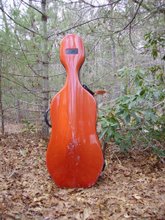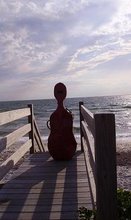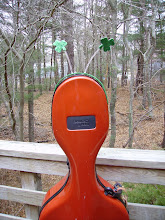
I’ve been writing these entries offline, in my room, rather than outside in the Wi-Fi center. Here’s an update on Tuesday and Wednesday. Thursday’s classes just ended (except for the electives, which I may skip today), and I will write about them later. I am catching on and learning much, but I am also getting tired, and the tunes are beginning to meld into conglomerate tune, or, as they say, “chune.”
Tonight is the clam bake (with lobster), a welcome break from standard camp food, which is often entirely yellow (corn, rice with leftover scrambled eggs mixed in, pasta, some other pasta, fish sticks, some sort of potatoes, and lemonade), with an occasional salad. I thought the world had embraced nutrition! The last two camps I went to had fresh organic fruits and vegetables, creatively cooked and presented. Oh well, the music is excellent here.
Tuesday, August 14, 2007
In Beginning Fiddling, we reviewed our March tune and learned a harmony part to Lovely Stornoway. We will be playing this waltz Wednesday night at the Harry Potter dance. Since there are two cellists in the class, we will alternate on harmony and sometimes both play melody with other fiddlers playing the harmony part.
We had an open period prior to Cello class in which one of the other cellists and I worked on the tunes. He was very helpful, reminding me to sing the tune and listen for the intervals. I now have one of the tunes memorized and almost up to speed. The other still need some practice, but it is coming. Playing these fiddle tunes and accompaniment by ear requires a bit of knowledge of music theory, so there are benefits beyond “merely” fiddling and memorizing.
In Cello class, we reviewed the two earlier tunes, with accompaniment, and learned a new air. I am catching on a little faster now. It helps to do a slow tune, though this one, “Da Auld Resting Chair,” is not all that slow, and it seems to have many sections to it, not just an A and a B part. The tunes always seem more complicated when you are first introduced to them, then make more sense when you work on them. I have not had time to work on this tune, as the day has been busy, as always. I went over some of the fingerings in Abby’s book, “Crossing to Scotland,” with her. Abby’s fingerings are simpler than those my teacher gave me, and I am happy to have them. She will have another book out soon, by the way, with music from her other CDs.
I did not play fiddle in the March down to greet the visitors boat because I loaned my fiddle to a woman whose fiddle was hit and cracked by a flying Frisbee while she was practicing in the meadow. (This was actually a relief for me, not having to worry about playing both fiddle and cello here!) I spent some time relearning the March tune on the flute, barely getting down to the dock on time. I didn’t play, as they were already into the fast version of the tune by the time I got there. The march was fun though, even (especially) not playing.
The march led to an open-air concert featuring our stellar teachers. Abby played in many of the sets, and I enjoyed that particularly. All the teachers are outstanding players and multitalented. My beginning fiddle teacher, Anne Hooper, also plays with the Boston Philharmonic. Hanneke Cassel, who will teach the beginners on Wednesday, teaches at multiple fiddle camps, plays with Rushad Eggleston, and is sort of a female version of Rushard, in that she plays chops/grooves and is a little loony. But she is much more articulate than RE and shares the stage much better than he does. She is behind the Harry Potter theme, and has assigned each fiddle class to Hogwart Houses and given roles to various teachers and administrators. She is energetic and creative and always seems to be having a good time. Catherine Fraser is an excellent fiddler from Australia. She’s probably my favorite fiddle player: lyrical, musical, expressive, and makes it look so easy. There are guitar and piano teachers too, but I haven’t gotten to know them.
Lots more playing tonight. In other camps I have attended, there are individual and small group performances, usually daily. Here, the focus is on playing in the larger ensemble. So we all played various tunes that each class has been working on as well as other Scottish session tunes. The cellists did have group performance though. I played accompaniment, as I do not have these tunes up to speed yet. I love them though and will continue to work on them, though I am getting increasingly snowed under with tunes as the week progresses.
I like the fact that this camp is so focused on one genre of music. At other camps, I have felt torn in many directions. But here, especially now that I loaned out my fiddle, I play only cello (except for that brief flute diversion), and I play only Scottish tunes. I am trying to decide if I would come back here next year. I would have to build a repertoire of Scottish fiddle tunes over the coming year. Not Abby Newton cello-oriented tunes, but standard session tunes that everyone else is playing. That means I would have to find someone to play Scottish tunes with throughout the year. We have Celtic groups on the Cape, but not specifically Scottish groups (except for the bagpipers).
Once I get back home, the other genres of music in my life will clamor for attention, and I don’t know if I will have time to learn even a small Scottish repertoire. I’ll keep working on learning by ear and accompaniment. I can teach the Scottish tunes I have learned to the Old Time fiddle group I play with, as they also play some Celtic music. I am inclined to come back here, just because it is so well-organized, friendly, and focused. Of course, it will depend on who is teaching cello.
Wednesday, August 15, 2007
Beginning Fiddle was taught by Hanneke Cassel today. She has a completely different approach from Anne. We started with physical rhythm exercises to prepare us for the new tune, “High Road to Linton.” This involved standing, stomping one’s feet while clapping out a 1-4-7 rhythm. (There are eight 8th notes in a 4/4 measure, and the accented notes are on the 1st, 4th, and 7th eighth notes.) We have do something similar in cello class, which just involves counting one-2-3, one-2-3, one-2, while playing a rapid accented accompaniment. We also did a little primal screaming, something Rushad did frequently in the camp I attended with him.
Hanneke played the tune and we sang it. Then she asked us to close our eyes and listen while she played the first few notes of the tune and asked up to copy her. She gave us no clues and we weren’t supposed to look at her fingers to see what notes she was playing. We did this for about 20 minutes, repeating sections of the tune, building on them, adding to them, until we could all play the A part of the tune. Amazing. I found the tune easy to learn this way, and it was a very soothing, comfortable experience.
Next, in cello class, we decided to play a waltz for the big Hogwart’s Ball this evening. We selected the “Tombigbee Waltz,” and I closed my eyes, listened, sang it, and learned it fairly quickly, without too many clues. I was so proud of myself, even though this is a much easier tune than the others we have learned this week. Then we worked out a couple of accompaniments, which the others had no trouble memorizing, but I wrote down the chord names.
Later in the afternoon, I was worried that I wouldn’t remember the tune, so wrote it down, listening to the recording I had made in class. I realized I had made a couple of mistakes, including not recognizing when two notes of the same pitch followed each other. I had that problem with two of the other cello tunes we learned this week too. At dinner I mentioned it to two fiddle teachers I was eating with. One said that that was one of the most common mistakes people make, not hearing repeated notes of the same pitch correctly. Whew! So, it is not just me.
Excitement about the Harry Potter party built during the day, with everyone trying to remember details from the book to create costumes and activities. Our cello band, for instance, was called Hagrid and the Magical Beasts (the beasts being the cellos, not us). The fiddle classes were named for the houses at Hogwart’s. The Beginner class was Griffindor because we are so brave. The costumes were varied and creative. I simply wore mismatched clothing, as did several others.
I don’t know what they do at Hogwart’s for fun, but we danced Scottish dances while various bands played. I played the “Tombigbee Waltz” with my cello group (five of us and an accordion player) and “Lovely Stornaway” with the Beginner Fiddling class with piano and two of us cellists. Both from memory and without too many mistakes, and I was comfortable enough to watch the dancers, not my cello. When you play a short waltz for dancers, you play it over and over again, maybe 10 times, so you have plenty of time to correct errors!
So, I feel pretty good about making progress in learning by ear this week, and it is only Wednesday. Two more full days of camp lie ahead. There will be more performances Friday night. The cello class with perform “Willie’s Auld Trews,” which I still have much work to do on. And there is another tune or two to learn tomorrow.
Friday, we will play 18th century Scottish chamber music by James Oswald, from sheet music! I am looking forward to that. Oswald was a cellist and so made the cello parts interesting, according to Abby.
 I bought this music on eBay when I first started the cello. It was in a collection of "easy music for beginning cellists." It is almost entirely first position, but does have its little challenges and is fun to play, and I am happy to finally have the opportunity to perform it!
I bought this music on eBay when I first started the cello. It was in a collection of "easy music for beginning cellists." It is almost entirely first position, but does have its little challenges and is fun to play, and I am happy to finally have the opportunity to perform it!

























